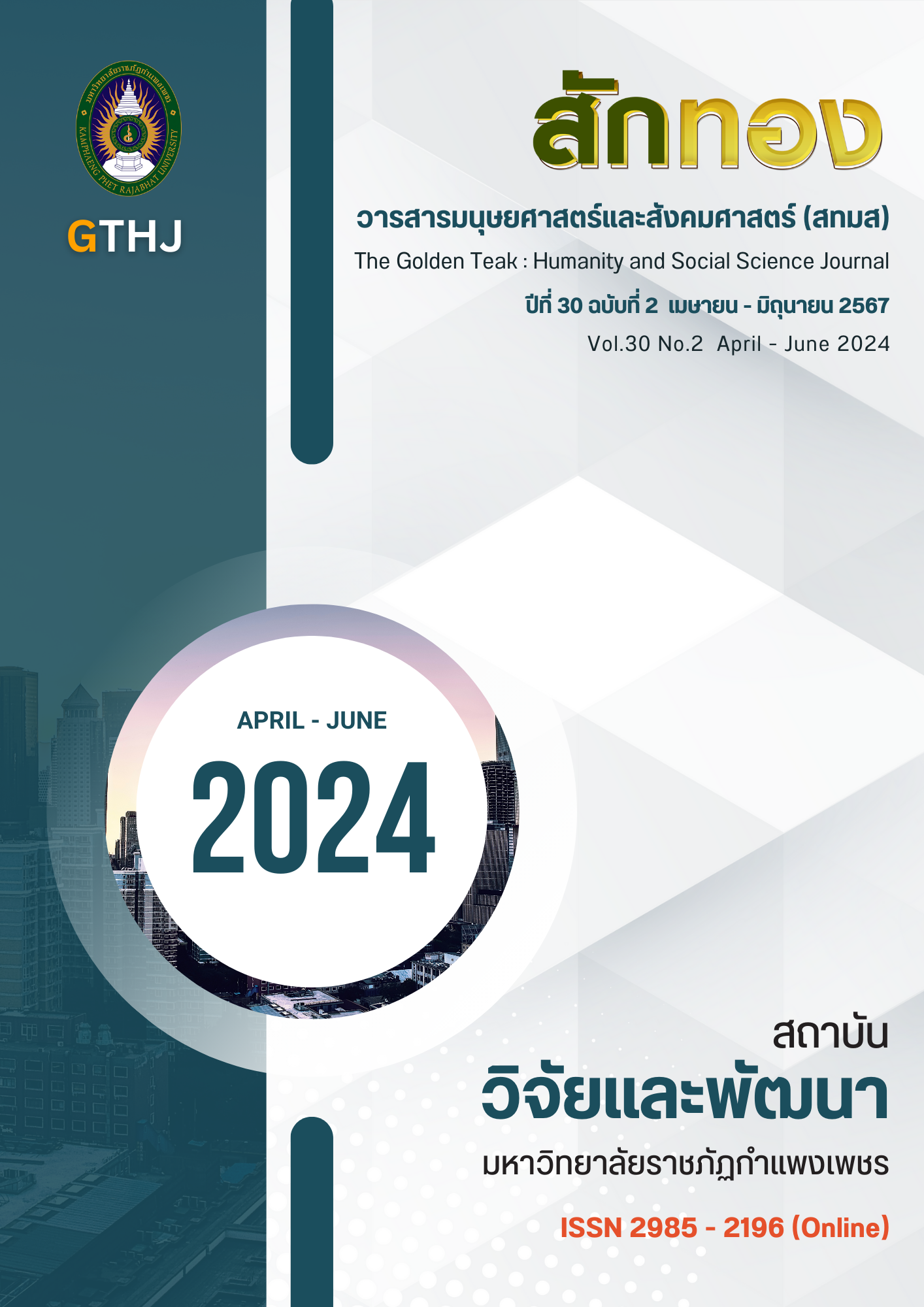The Guideline for Health Tourism Activities Development for Senior Tourists at Resorts in Chiang Rai
Main Article Content
Abstract
This study aims to explore the behavior of senior tourists and identify key factors that are important for health and wellness activities in Chiang Rai's resorts The qualitative approach was employed, utilizing in-depth interviews and focus group techniques. The study involved conducting in-depth interviews with 20 tourism stakeholders and organizing six focus groups consisting of senior tourists, both Thai and foreigners. The data was analyzed by using content analysis and thematic analysis. The results indicate that Chiang Rai has significant potential for health tourism The majority of tourism stakeholders acknowledge the significance of senior tourists as a key segment for health and wellness resorts. This recognition can lead to the creation of more activities and service opportunities within the resorts. Factors that are important when choosing the health activities in resort in Chiang Rai include facility, service and communication, and interesting tourism and health activities Moreover, senior tourists' behavior can vary depending on three elements: income, time availability, and health considerations. Most senior tourists express their preference for engaging in health activities at resorts in Chiang Rai due to the beneficial effects on their physical and mental well-being. Consequently, relevant stakeholders should focus on developing and enhancing facilities to cater to senior tourists, providing staff training, promoting and supporting local health wisdom to benefit the community, and driving the business sector forward.
Article Details

This work is licensed under a Creative Commons Attribution-NonCommercial-NoDerivatives 4.0 International License.
บทความที่ได้รับการตีพิมพ์เป็นลิขสิทธิ์ของวารสาร สักทอง : วารสารมนุษยศาสตร์และสังคมศาสตร์ สถาบันวิจัยและพัฒนา มหาวิทยาลับราชภัฏกำแพงเพชร
ข้อคิดเห็นใดๆ ที่ปรากฎในวารสารเป็นวรรณกรรมของผู้เขียนโดยเฉพาะ ซึ่งมหาวิทยาลัยราชภัฏกำแพงเพชรและบรรณาธิการไม่จำเป็นต้องเห็นด้วย
References
Ashton, A.S. & Klinhom, C. (2020). Wellness Tourism Development in the Hotel Industry : Tourist Perspective. Journal of Tourism Quarterly, 2(3-4), 54-66.
Alén, E., Losada, N. & Domínguez, T. (2016). The Impact of Ageing on the Tourism Industry : An Approach to the Senior Tourist Profile. Social Indicators Research, 127(1), 303-322.
Batra, A. (2009). Senior Pleasure Tourists: Examination of Their Demography, Travel Experience and Travel Behavior Upon Visiting the Bangkok Metropolis International. Journal of Hospitality and Tourism Administration, 10(3), 197-212.
Chang, L., Moyle, B.D., Dupre, K., Filep, S. & Vada, S. (2022). Progress in research on seniors' well-being in tourism: A systematic review. Tourism Management Perspectives, 44.
Chansawang, R., Kaewudom, Y. & Esichaikul, R. (2022). The lifestyle and travel behaviors if high-spending Thai senior tourists. University of the Thai Chamber of Commerce Journal Humanities and Social Sciences, 42(2), 1-21. [In Thai]
Chusri, W. & Lalitsasivimol, W. (2020). Health Tourisms: Thailand’s Competitiveness. Journal of Humanities and Social Sciences, Princess of Naradhiwas University, 7(2), 205-226. [In Thai]
Department of Older Persons. (2022). Current Situation of Senior Society and Economy in Thailand. [Online]. Available : https://www.dop.go.th/th/know/15/926 [2023, May 10]. [In Thai]
Hongsup, A. & Pokaiyaudom, G. (2015). The guideline for developing hot spring resource in health tourism destination in Northern Thailand. Journal of Sports Science and Health, 16(3), 76-90. [In Thai]
Hunter-Jones, P. & Blackburn, A. (2007). Understanding the Relationship between Holiday Taking and Self-Assessed Health : An Exploratory Study of Senior Tourism. International Journal of Consumer Studies, 31(5), 509-516.
Krajangchom, S., Maneetrakulthong, A., & Srichai, P. (2019). Guidelines for the Development of Tourism Activities for Foreign Senior Tourists in Lanna Civilization Zone. University of the Thai Chamber of Commerce Journal Humanities and Social Sciences, 39(3), 75-90. [In Thai]
Lee, S.H. & Tideswell, C. (2005). Understanding attitudes towards leisure travel and the constraints faced by senior Koreans. Journal of Vacation Marketing, 11(3), 249-263.
Lee-Anant, C. (2022). Guidelines of health tourism management for elderly tourists. Journal of Yala Ratchabhat University, 17(1), 147-155. [In Thai]
Lertbuasin, S. (2022). The development of slow tourism programs for elderly tourists in Chacjengsao. RMUTT Global Business and Economics Review, 17(1), 122-134. [In Thai]
Mill, R.C. (2009). Resorts : Management and Operation. New York : Wiley & Sons.
Ministry of Tourism and Sport. (2023). Annual Thailand Tourist Arrivals in 2023. [Online]. Available : https://www.mots.go.th/news/category/659 [2023, May 12]. [In Thai]
Nyaupane, G.P. & Andereck, K.L. (2008). Understanding Travel Constraints: Application and Extension of a Leisure Constraints Model. Journal of travel research, 46(4), 433-439.
Office of National Higher Education Science Research and Innovation Policy Council. (2022). Health Tourism Opportunities After Covid-19 Pandemic for Sustainable Development. [Online]. Available : https://www.nxpo.or.th/ th/4815/ [2023, May 10]. [In Thai]
Patterson, I. (2007). Information sources used by older adults for decision making about tourist and travel destinations. International Journal of Consumer Studies, 31(5), 528-533.
Saennampol, N., Madhyamapurush, W., Pakdeepinit, P. & Sreesoompong, P. (2020). The Situation and Potentiality of Related Tourism Business Surrounded Hot Springs Attractions in the Upper Northern Provincial Cluster-Thailand. Journal of Social Academic, 14(1), 1-19. [In Thai]
Sie, L., Pegg, S. & Phelan, K.V. (2021). Senior tourists’ self-determined motivations, tour preferences, memorable experiences and subjective well-being: An integrative hierarchical model. Journal of Hospitality and Tourism Management, 47(1), 237-251.
Teerakiatkamjorn, A. (2011). Quality of life of elders in Suthep Sub-district, Mueang District, Chiang Mai Province. Master Thesis, Chiang Mai University. [In Thai]
The Chiang Rai Provincial Office. (2020). Chiang Rai’s Five-year Strategic Plan (2023-2027). [In Thai]


